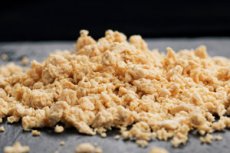Benefits of mycoproteins in disorders of fat metabolism
Last reviewed: 07.06.2024

All iLive content is medically reviewed or fact checked to ensure as much factual accuracy as possible.
We have strict sourcing guidelines and only link to reputable media sites, academic research institutions and, whenever possible, medically peer reviewed studies. Note that the numbers in parentheses ([1], [2], etc.) are clickable links to these studies.
If you feel that any of our content is inaccurate, out-of-date, or otherwise questionable, please select it and press Ctrl + Enter.

If products with mycoproteins are consumed for a month, replacing meat dishes, it is possible to significantly reduce the content of unfavorable cholesterol in the blood of obese or hypercholesterolemic people. A similar effect can be achieved, for example, by switching to vegetarianism. About the new work of employees of the British University of Exeter - further in our article.
Cardiovascular pathologies are recognized as one of the most frequent causes of fatal outcomes. Among the main risk factors are elevated blood glucose or insulin levels, obesity of various degrees and hypercholesterolemia. Taking this into account, the recommended preventive measures to prevent cardiac and lipid metabolism disorders are physical activity and nutritional correction.
Nutritionists have proposed dietary changes by including mycoprotein products in the diet, replacing meat with them. Scientists analyzed the effect of such products on the indicators of all known cholesterol fractions and on other diagnostic values in adult patients with high body mass index and elevated blood cholesterol levels.
Mycoprotein is a product with a higher protein and fiber content. It is obtained by fermentation of the ascomycete fungus Fusarium.
Scientists conducted an experiment involving more than seventy obese volunteers. Among the participants were less than thirty men, and more than fifty female representatives, whose average age was 41-45 years, and body mass index - from 32 to 34.
All participants were randomly divided into two groups. Representatives of the first group replaced meat dishes with mycoproteins in their diet, while the second group continued to consume meat and fish products.
Before the experiment, all participants underwent diagnostic tests, blood tests to assess the quality indicators of fat metabolism.
Representatives of the first group consumed food enriched with protein and fiber for one month. When the experiment came to an end, the subjects had their blood drawn again for tests and their BMI measured. Specialists found that people who ate mycoprotein (about 180 g daily), adverse cholesterol decreased by more than 10% - about 0.3 mmol per liter. The effect can be compared with the medicinal effect: for example, taking statins in standard dosages leads to a decrease in this indicator by 0.3-1.3 mmol per liter only after a year.
Among other things, participants in the first group had a more than 10% decrease in blood glucose and a nearly 30% decrease in c-peptide levels, compared to the second group.
It is known that normalization of the concentration of unfavorable cholesterol significantly reduces the risks of cardiac pathologies throughout life. Refusal of meat dishes in favor of mycoprotein products helps to quickly stabilize the content of basic values of lipid metabolism and improve the cardiovascular system without taking drugs.
Learn more at source
